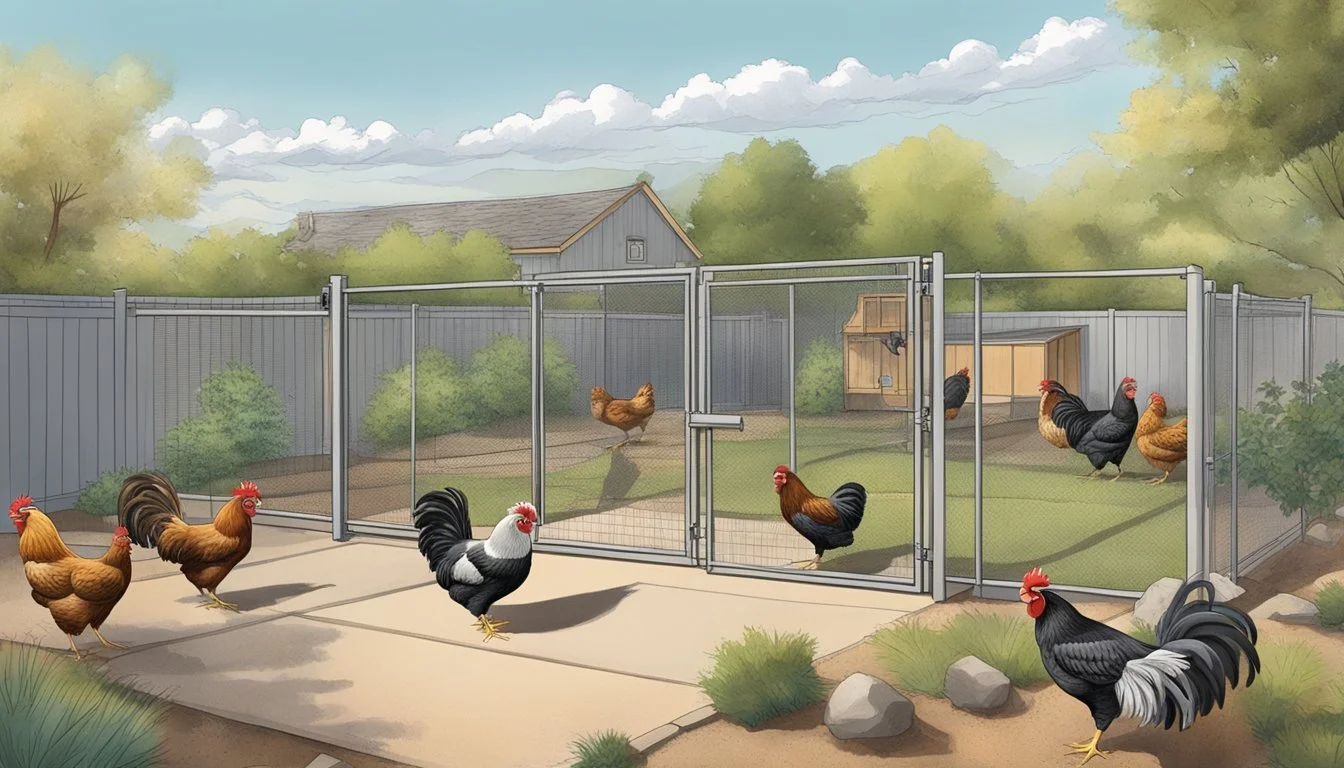Raising Backyard Chickens in Enterprise, NV
A Practical Guide for Urban Poultry Farming
Raising backyard chickens has become a popular practice among residents of Enterprise, NV, offering an opportunity to enjoy fresh eggs, natural pest control, and the joy of caring for these animals. While the state of Nevada generally allows the keeping of backyard chickens, specific regulations can vary by city and county, which makes it crucial for potential chicken owners in Enterprise to understand the local ordinances. It is important for residents to know the particular requirements such as permit needs, enclosure specifications, and the number of chickens allowed to ensure they comply with local laws.
In Enterprise, individuals looking to keep backyard chickens must adhere to Clark County's guidelines since the area falls under its jurisdiction. The County's regulations outline the ownership and keeping of chickens without running afoul of the law, detailed in Title 10 of the Clark County Code, and focus on the welfare of the animals as well as the interests of the community. Understanding and complying with these statutes not only helps in maintaining a harmonious neighborhood but also ensures that the chickens are kept in a healthy and safe environment.
Backyard chickens in Enterprise must be maintained within secure enclosures and are typically required to be at a certain distance from neighboring properties to minimize any potential nuisances. The awareness and respect of these guidelines can lead to a rewarding experience of raising chickens, and it provides fresh produce for families while contributing to sustainable living practices. Residents are advised to conduct thorough research or consult with local authorities to gain comprehensive knowledge of these regulations prior to starting their backyard chicken endeavors.
Understanding the Local Laws
When raising backyard chickens in Enterprise, NV, residents must navigate the intricacies of local laws, which include both zoning ordinances and specific space requirements.
Zoning Ordinances and Permits
The Clark County Code governs the keeping of chickens in Enterprise, which is an unincorporated town within Clark County. Residents must comply with the ordinances set forth in Title 10 - ANIMALS AND FOWL. These ordinances outline that the county does not require a permit for keeping backyard chickens; however, one must adhere to zone-specific regulations that differentiate between rural and residential zones. It is crucial for residents to ensure that their property is zoned for the keeping of chickens. Las Vegas, as a part of Clark County, shares similar regulations, but with slight variations tailored to the urban environment.
Property Line and Space Regulations
Local ordinances mandate that chicken coops or enclosures must be kept at a minimum distance from property lines. Specifically, coops should be placed at least 10 feet from all property lines to minimize disturbances to neighbors and to maintain a clean and healthy environment. The County Code stipulates the following for residential areas:
Backyard chickens must be kept in a secure enclosure.
Coops are required to comply with space regulations to ensure proper management and welfare of the animals.
Adhering to these local laws and regulations is essential for Enterprise residents wishing to raise chickens in their backyards in a lawful and neighborly manner.
Choosing Your Chickens
When starting a backyard chicken flock in Enterprise, NV, one needs to consider the breed's adaptability to the local climate and its compatibility with residential regulations. It is also essential to distinguish between the needs of hens and roosters and to understand their dynamics within the flock.
Selecting the Right Breed
Choosing the right breed of chicken for your Enterprise backyard is crucial. Different breeds can significantly vary in temperament, egg production, and climate adaptability. Here are a few suitable breeds for beginners:
Australorps: Known for their high egg production and calm demeanor, Australorps are an excellent choice for warmer climates like Nevada.
Rhode Island Reds: Renowned for their hardiness and consistent egg-laying, they can withstand varied climates.
Orpingtons: These chickens are friendly and capable of producing a good number of eggs; they also handle heat well.
Sussex: This breed offers a good temperament and is also a reliable layer.
Given local regulations, it's advisable to choose breeds categorized as pullets (young hens) for better noise control and compliance with laws on rooster ownership.
Understanding Hen and Rooster Dynamics
While hens are the key to egg production, roosters can influence the flock's dynamics. Roosters often act as protectors of the hens, but they can also be noisier and more aggressive. Residential areas in Enterprise may have restrictions on or outright bans on rooster ownership to prevent noise issues. In choosing chickens for a backyard, one typically opts for hens only. However, if local laws permit and one has a preference or need for a rooster, it's crucial to account for their space requirements and the impact they may have on the flock and neighborhood.
Providing Proper Housing
Providing proper housing for backyard chickens in Enterprise, NV, entails designing a coop that offers sufficient space and ensuring it has good ventilation while being secure from predators. A well-designed chicken coop contributes to the health and well-being of the chickens, which in turn, leads to better egg production.
Designing an Ideal Coop
An ideal coop in Enterprise, NV, should balance space requirements with local Clark County regulations. The coop must be spacious enough to allow chickens to roam, scratch, and nest comfortably. For most backyard flocks, the general rule is to provide at least 3-4 square feet of coop space per chicken. When designing your coop, consider the following aspects:
Size: Ensure the coop is large enough to house your flock, keeping in mind that chicken-keeping can be expansive, and you may wish to add more birds in the future.
Materials: Use durable materials to withstand Enterprise's climate, offering protection from extreme temperatures.
Accessibility: Include doors or panels that allow easy access for cleaning and egg collection but are secure against intrusion.
Ensuring Adequate Ventilation and Protection
Ventilation is crucial for maintaining a healthy coop environment, reducing the build-up of ammonia from droppings and minimizing respiratory issues. Protection, on the other hand, involves safeguarding your flock from common predators in the region. Adequate ventilation and predator-proofing can be achieved with the following steps:
Ventilation: Install vents or windows that provide a steady flow of air but can be closed in harsh weather. Ensure that the air circulation is above the roosting chickens to prevent drafts.
Predator-Proofing: Construct the coop with sturdy materials and secure latches. Elevate the coop on posts and cover outdoor runs with wired fencing to deter digging predators. Use hardware cloth instead of chicken wire for better security against small, determined predators.
Feeding and Nutrition
Feeding and nutrition are critical to the health and productivity of backyard chickens in Enterprise, NV. A carefully planned diet ensures chickens have the energy for growth, egg production, and staying healthy.
Feeding for Optimal Health
To achieve optimal health, chickens require a balanced diet that consists of proteins, carbs, and fats along with vitamins and minerals. Chickens start with a starter feed, which is high in protein—about 18-20% for chicks and 22-24% for meat birds—to support rapid development. When chickens reach the age of 6 weeks, they should be transitioned to grower feed which contains 14-18% protein. As they begin to lay eggs, transition to layer feed with 16-18% protein, which also includes calcium such as crushed oyster shells to support shell integrity. For meat chickens, broiler feed with 20-24% protein is recommended.
Proteins are vital, but so are carbohydrates. Grains such as corn, wheat, and barley are excellent sources of energy for chickens. While commercial feed typically includes these grains, they can also be supplemented directly.
Understanding Nutritional Needs
A comprehensive understanding of the nutritional needs of chickens is necessary for their well-being. Amino acids, such as methionine and lysine, must be present in the feed. A range of vitamins including vitamin A, D3, B12, and E are essential, alongside minerals like copper sulfate and phosphorus.
Chickens also benefit from a diet incorporating nutrients like fiber, which aids in their digestion. Occasionally, table scraps can be given with caution; however, kitchen scraps should be healthy and should not include toxic foods like chocolate or onion. Mealworms can be a nutritious treat rich in protein.
It is vital for chicken keepers in Enterprise, NV to provide their flock with a well-rounded diet that supports every stage of their development and keeps them thriving in their environment.
Health and Well-Being
Maintaining the health and well-being of backyard chickens in Enterprise, NV, centers on rigorous routine cleaning and timely recognition of diseases and pests. Owners must prioritize a clean living environment and be vigilant about health issues to ensure the flock's longevity and productivity.
Routine Cleaning and Maintenance
Chickens thrive in sanitary conditions; hence, regular cleaning and maintenance of their coop are imperative. It is recommended to perform a daily cleanup of droppings and a weekly sanitization of feeders and waterers.
Daily Tasks:
Remove fresh chicken manure.
Check for signs of pests or rodents.
Weekly Tasks:
Scrub and disinfect feeders and waterers.
Replace bedding to keep the coop dry.
Recognizing Chicken Diseases and Pests
A chicken's well-being can be compromised by diseases and pests, making early detection crucial. Common symptoms include changes in behavior, appearance, or egg production.
Signs to Watch For:
Respiratory issues: coughing, sneezing
Digestive changes: diarrhea orchanges in feces
Lethargy or decreased egg-laying
Establishing a pest control regimen, coupled with routine checks for lice, mites, and rodent activity, prevents the spread of diseases and maintains a flock's optimal health.
Raising Chicks
Raising chicks in Enterprise, NV requires knowledge of hatching, brooding, and careful integration into the flock. The key to success lies in creating a safe, warm environment for the young birds and proper planning for their growth.
Hatching and Brooding Your Own Chicks
When hatching eggs, it's crucial that Enterprise, NV residents maintain the right conditions. Incubators should be set at a steady 99.5 degrees Fahrenheit with a humidity level of approximately 50-65%, slightly higher for the last few days before hatching. Turning the eggs three to five times daily helps prevent the embryo from sticking to the shell. After the chicks hatch, they should be moved to a brooder. This is a warm, safe space with temperatures initially set at 95 degrees Fahrenheit and reduced by 5 degrees per week until the chicks are acclimated to outdoor temperatures.
Checklist for brooder setup:
Heat source: Typically a heat lamp
Bedding: Pine shavings or similar absorbent material
Feed: Starter chick feed with 18-20% protein
Water: Fresh and clean, with marbles or pebbles to prevent drowning
Integrating Chicks into the Flock
Introducing baby chicks into an existing flock is a delicate process that should be done gradually. They are typically ready to join the flock once they're fully feathered, at about 6 weeks of age, but this can vary. During this time, they should be separated yet visible to the older chickens, letting both groups get accustomed to each other.
Integration steps include:
Separate but Visible: Enclose chicks where the flock can see but not harm them.
Supervised Interaction: Allow brief periods where chicks and adult chickens interact under close supervision.
Partial Integration: Place the chicks in an adjacent space within the coop.
Full Integration: Once they show confidence and the pecking order is established, allow the chicks to roam freely with the flock.
It is vital to monitor the chicks for signs of bullying or injury during this period and to provide retreat spaces for them to escape if necessary. Remember that the stronger, more confident individuals will establish themselves higher in the pecking order.
Managing Egg Production
Effective management of egg production in backyard chickens involves not only the correct setup to encourage laying but also proper techniques for collecting and storing the eggs produced. With a focus on free-range chickens and optimum egg production, backyard poultry keepers in Enterprise, NV, can ensure a steady supply of fresh eggs.
Collecting and Storing Fresh Eggs
Regular collection of eggs is crucial. Hens typically lay once a day, and collecting eggs should occur at least once or twice daily to prevent breakage or becoming dirty. After collection, it’s important to store the eggs at a consistent and cool temperature to maintain freshness.
Storage Technique:
After collection, clean any dirt off the eggs with fine sandpaper, a brush, or a cloth.
Store eggs large end up to keep the yolk centered.
Refrigeration can preserve egg freshness for up to 5 weeks.
Hygiene Practice:
Avoid using water to clean eggs as it can remove the natural protective coating, known as the “bloom.”
By establishing a routine for collection and adhering to proper storage practices, egg quality is preserved, enhancing their suitability for both immediate consumption and longer-term use.
Understanding Laying Patterns and Setup
A hen's laying pattern can be influenced by factors such as breed, age, and environment. Understanding these patterns helps in planning the setup of nesting boxes within the coop.
Nesting Boxes:
Provide one nesting box for every three to four hens to avoid overcrowding.
Nesting boxes should be raised off the ground, comfortable, and secluded to make hens feel secure.
Lighting:
Chickens need approximately 14-16 hours of light each day to maintain optimal egg production.
In Enterprise, NV, supplement natural light with artificial lighting during shorter winter days.
Diet and Foraging:
Balanced nutrition including calcium and protein is essential for egg production.
If not free-ranging, provide a designated dust bath area and space for foraging to allow natural behaviors.
Understanding these key elements and factoring them into the daily care of backyard chickens will support consistent egg production and the overall health of the flock.
Building Relations with Neighbors
When deciding to raise backyard chickens in Enterprise, NV, it is crucial to address neighbor relations, focusing specifically on mitigating noise and nurturing community engagement.
Handling Noise and Nuisance Issues
One of the primary concerns when raising chickens is the potential noise, especially if roosters are part of the flock. Enterprise, NV residents must respect local ordinances, which often prohibit the keeping of crowing roosters due to the noise. Residents can minimize noise by:
Selecting Hen-Only Flocks: Opting to keep only hens, which are significantly quieter and still provide the benefit of fresh eggs.
Proper Coop Insulation: Enhancing the chicken coop with sound-absorbing materials can help muffle the sounds of chicken activity.
Communication: Discuss potential noise concerns with neighbors beforehand and establish an open line of communication for any nuisance issues that may arise.
Community Engagement and Education
Building positive relationships with neighbors involves transparency and education about the benefits and responsibilities of keeping backyard chickens. Residents should consider:
Informative Meetings: Hosting casual meet-and-greets to inform neighbors about their chicken-keeping practices and how they plan to manage the flock responsibly.
Sharing Resources: Offering eggs or inviting neighbors to see the chickens can create a sense of community and allay fears about the potential nuisance.
Regulatory Compliance: Staying informed and compliant with all local zoning and livestock regulations pertinent to backyard chickens ensures that residents maintain good standing within the community.
Navigating Local Chicken Keeping Culture
In Enterprise, NV, chicken enthusiasts can dive into the local culture by joining clubs and participating in events that celebrate poultry keeping. These activities offer opportunities to connect with the community, share knowledge, and stay informed about local regulations.
Joining Local Poultry Clubs and Online Groups
Enthusiasts keen on raising backyard chickens often find a wealth of resources and support through local poultry clubs. These organizations typically host meetings where members can discuss best practices, exchange advice, and stay updated on any local government policies related to chicken keeping. Online groups provide additional support, with forums and social media platforms allowing for the quick exchange of information.
Local Poultry Clubs:
Meetings: Attend regularly scheduled gatherings to connect with fellow chicken keepers.
Educational Resources: Access information about care, feeding, and coop maintenance.
Local Regulations: Learn about any updates from local government regarding backyard chickens.
Online Groups:
Forums: Ask questions and receive advice from experienced chicken keepers.
Social Media: Follow local poultry-related pages for news on events and policy changes.
Participating in Poultry Shows and Events
Poultry shows and community events are excellent venues for backyard chicken keepers to display their birds, learn from others, and engage with the wider chicken enthusiast community. These events often include competitions judged by established standards, providing a platform to highlight the quality and care of one's chickens.
Poultry Shows and Events:
Exhibition: Showcase well-cared-for chickens and learn from others’ techniques.
Competitions: Enter chickens into contests judged by specific breed standards.
Networking: Build relationships with other poultry enthusiasts and local clubs.
Addressing Predators and Security
In Enterprise, NV, safeguarding backyard chickens is crucial due to the presence of local wildlife and domestic predators. Adequate security measures are essential to protect poultry flocks.
Safe Guarding Against Common Predators
Common predators in Enterprise include coyotes, raccoons, hawks, and neighborhood dogs. Each predator has its methods of attack, so defenses should be multi-layered.
Above Ground: Hawks and other birds of prey swoop down from above. Use overhead netting or wires to prevent them from reaching the chickens.
Ground Level: Coyotes and dogs can break through weak barriers. A fence that is buried at least 12 inches underground deters digging predators. Additionally, the fence should be at least 6 feet high with a top angle to discourage climbing.
At Entrance Points: Raccoons are clever with latches. Employ keyed locks or combination locks on coop doors to ensure they remain closed against intelligent predators.
Employing Predator-Proof Strategies
Creating a predator-proof chicken coop and run requires a proactive approach with durable materials and vigilant design.
Materials: Use hardware cloth instead of chicken wire for enclosures. Hardware cloth is more robust and offers better protection as it's difficult for predators to tear through.
Flooring: Secure the floors of coops and runs from burrowing animals. If possible, lay a concrete base or place hardware cloth beneath the soil surface.
Locks: Keyed or combination locks should be employed on all doors to prevent clever predators, like raccoons, from gaining access.
Entrances and Exits: An automatic door opener for the coop can be set to open and close at specific times, reducing the chance of predators entering when the chickens are most vulnerable.
Implementing these practices minimizes risk and helps keep chickens secure in their environment.
Exploring the Benefits of Backyard Chickens
Backyard chickens in Enterprise, NV, offer a range of advantages from enhancing food security through access to fresh eggs to positive environmental impacts that contribute to sustainability.
Egg Quality and Food Security
In Enterprise, homeowners who raise backyard chickens benefit from a consistent supply of fresh eggs. These eggs, often touted as organic, surpass store-bought options in freshness and can potentially be more nutrient-dense, depending on the birds' diet. Backyard chickens can also provide meat, serving as an additional resource of homegrown food, fostering a level of food independence for the family.
Environmental Impact and Sustainability
Backyard chickens play a role in local sustainability efforts. They assist in weed and pest control, as they naturally forage for insects and consume unwanted vegetation. Their droppings enrich the soil, thus reducing the need for artificial fertilizers. Moreover, incorporating chickens into a backyard ecosystem can lessen household waste, as chickens can eat various food scraps, thereby recycling organic waste into valuable compost.












